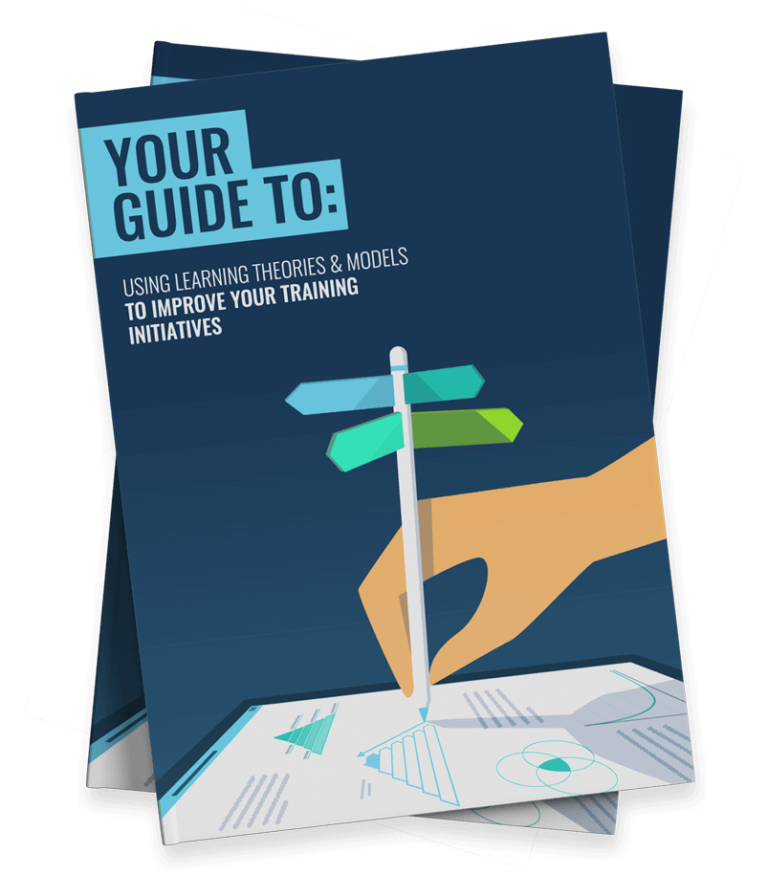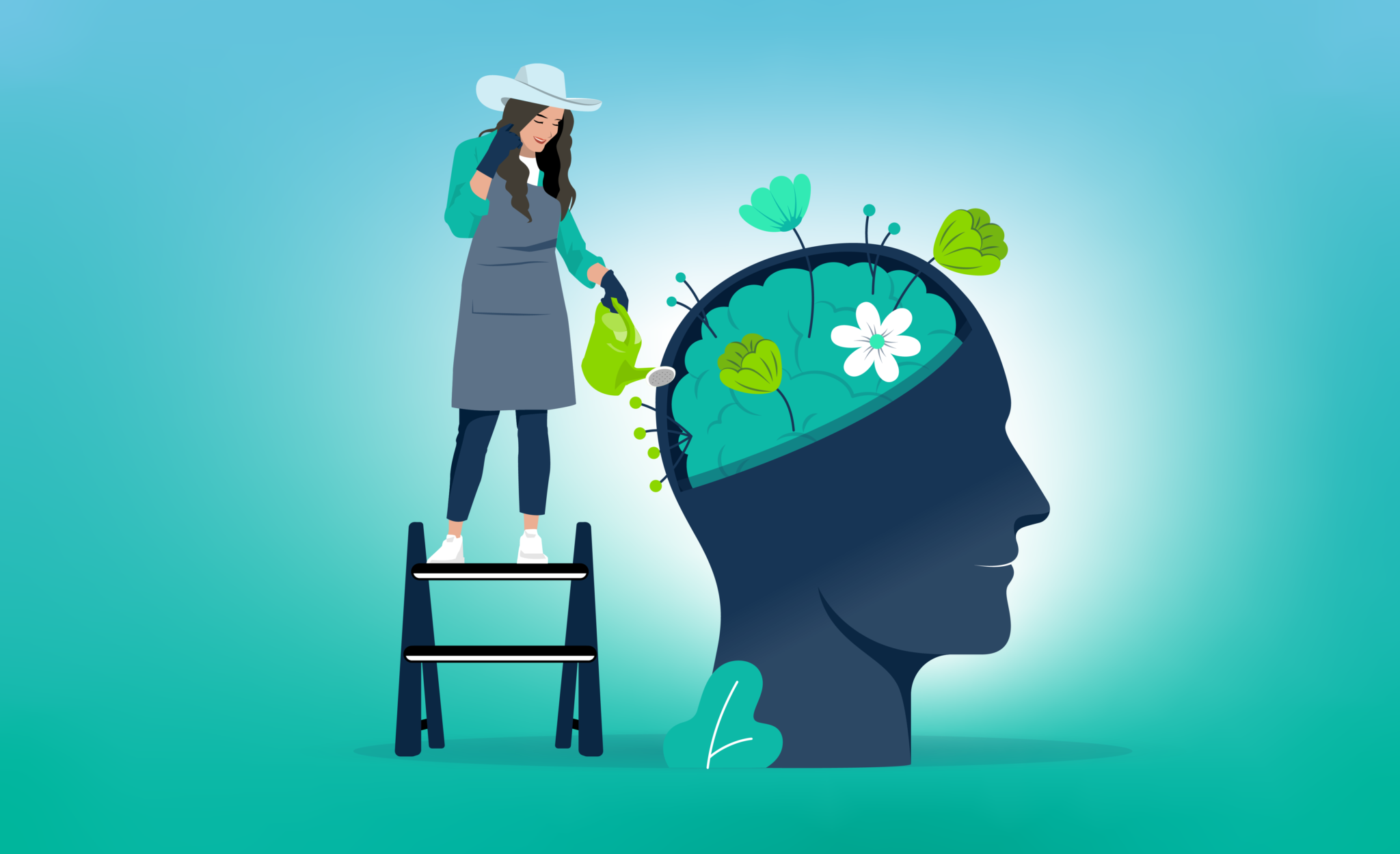
Few figures loom as large in the annals of intellectual history as Aristotle. Whilst his fertile mind pursued a wide-array of inquiries, his central focus was on human happiness and flourishing. In his view, the route to this goal is through education and learning.
It’s hardly surprising that Aristotle held strong views on learning. He studied under Plato. He started his own school. He tutored world-conquering greats. He also devoted as much time to teaching as he did to research. In this sense, he could be considered the first ‘professor’.
As Jonathan Barnes puts it, ‘[Aristotle] bestrode antiquity like an intellectual colossus. No man before him had contributed so much to learning. No man after could hope to rival his achievement.’
Unfortunately, only around 20% of Aristotle’s written work has survived. Worse still, only fragments of his work On Education still exist. Despite this, we are still able to find a rich tapestry of insights that weave together threads of theory, practice and moral development.
Remarkably, despite the passage of time, these views still hold relevance for contemporary educators and learners. In this article, we’ll delve into these timeless insights and examine their role in today’s modern learning environment. Your philosophical journey starts here.
Who was Aristotle?
It’s hard to overstate Aristotle’s influence. The poet Dante hailed him as ‘the master of those who know’. Meanwhile, Thomas Aquinas gave him the title of ‘The Philosopher’, as if he represents the Platonic ideal of what a philosopher is.
As for his philosophical standing, Christopher Shields notes, ‘judged solely in terms of his philosophical influence, only Plato is his peer.’
Aristotle was born in 384 BCE in a small town in northern Greece. He was a philosopher and all-round polymath. Indeed, during his time, he turned his attention to the natural sciences, linguistics, economics, politics and education. That’s quite an intellectual legacy.
His biography reads like a movie script. It teems with intrigue, incident and unexpected cameos. Indeed, his list of achievements is nothing short of awe-inspiring. He…
- Spent 20-years studying with Plato (another philosophical all-timer).
- Set up his own school (‘the Lyceum’).
- Tutored Alexander the Great (who really earned that nickname).
- Developed the first formal system for reasoning and founded the field of biology.
Not bad, right? But, it’s his philosophical views that have been most influential. His profound perspectives on life, virtue and happiness have left an indelible imprint on the trajectory of Western thought and education. Let’s dip our toes into these insights now.
An Overview of Aristotle’s Philosophy

Aristotle’s philosophy is not easily summarised. After all, this is a thinker who was defined by his voracious appetite for knowledge and his relentless intellectual curiosity. As we’ve seen, he explored a wide-range of topics.
Yet, amidst this diversity, it is clear that he was ultimately on a quest to understand the world around him and the intricacies of the human condition.
At the heart of Aristotle’s philosophy is the concept of teleology. This is the belief that everything has a purpose or a goal towards which it naturally tends.
We all have the potential to achieve our purpose. Actualising it, however, requires development and realisation. This principle serves as a crucial lens to understand Aristotle’s views on learning and education.
This is linked to Aristotle’s concept of ‘eudaimonia’, a term that is difficult to translate, but could be understood as ‘happiness’ or ‘human flourishing’. According to Aristotle, achieving this ‘highest good’ requires living a virtuous life.
This gives rise to Aristotle’s principle of the ‘Golden Mean’. The ‘mean’ is the virtue that lies in finding the moderate or balanced path between extremes of deficiency and excess. For instance, ‘courage’ is the virtue that lies between cowardice and recklessness.
We should also recognise Aristotle’s emphasis on empirical observation and systemic inquiry. This grounded approach, rooted in meticulous analysis, marked a departure from the Platonic belief in innate ideas.
Aristotle on Schooling
Aristotle was a strong advocate for public education. He argued that schooling should be provided by the state and must be ‘one and the same for all’. This democratic approach to education is especially remarkable when viewed against the backdrop of ancient Greece’s culture of competition.
Like Plato before him, Aristotle spent a good deal of time considering the role of an education system in his vision of an ideal city. He suggested the following structure:
- Age 0-5: In their earliest years, children should be trained by games. These games must not be ‘vulgar or exhausting or effeminate’.
- Age 5-7: Following this, children should become spectators of the lessons they are soon to learn.
- Age 7-21: At this stage, children enter school. First they focus on reading, writing and drawing. In later years, they should integrate poetry, drama and dancing.
- Age 21+: Schooling ends, but education continues. Adult learning should include physical education and military instruction.
Aristotle on Learning
Aristotle’s philosophical framework helps us to understand his views on learning. While we may lack a singular thesis on the topic, it’s evident that learning held significant importance within his philosophical musings.
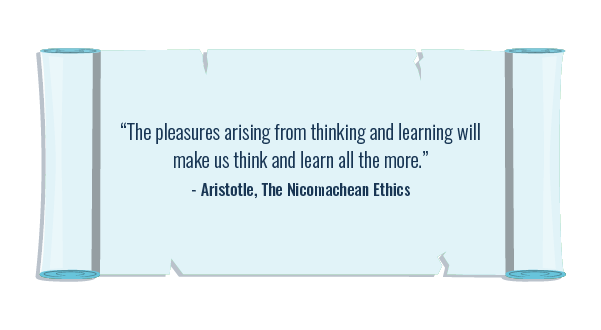
‘The pleasures arising from thinking and learning will make us think and learn all the more.’ — Aristotle, The Nicomachean Ethics
Let’s explore the principles that encapsulate his holistic and interconnected approach to learning and education:
- Anamnesis: This phrase, meaning ‘reminiscence’ or ‘recollection’, suggests that knowledge is not merely acquired from external sources, but is inherent within us all. As a result, fundamental truths can be discovered through introspection and reflection.
- Experience: Despite this, Aristotle does not dismiss the role of experience in learning (hello, constructivists!). He argues that genuine understanding cannot arise through reasoning alone. Triggering anamnesis requires interaction with the physical world around us.
- Habituation: Aristotle also highlights the importance of habituation (‘ethos’) in a learning process. He argues that virtuous behaviour isn’t just an intellectual pursuit. Instead, it requires consistent practice and moral education. Holding beliefs isn’t sufficient, we must actively embody our values.
- Practical Wisdom: The concept of ‘phronesis’ or practical wisdom also plays a role in Aristotle’s views on learning. He notes that sound judgements and ethical decisions stem from the fusion of theoretical knowledge and real-world application. A balanced combination of both is essential.
As you can see, Aristotle’s method often involves finding harmony or a healthy balance (the ‘mean’) between two opposing forces. Knowledge is innate, but it can only be ‘released’ through experience. Real learning requires theory and practice.
Aristotle also advocated for a holistic approach to learning that transcends simple knowledge acquisition. You should also strive to cultivate virtue, live ethically and build practical skills. Only then can you attain eudaimonia, or true human flourishing.
Aristotle’s Pedagogy
Aristotle’s holistic approach is reflected in his pedagogical method. He stressed the importance of personalised instruction, active engagement and the cultivation of practical wisdom. These themes still endure in educational discourse today.
Indeed, modern scholars note that the ‘Aristotelian approach to teaching is… not only interesting but also quite useful.’ Bold claims, given that these views are now over 2,300 years old. With this in mind, let’s explore these enduring principles.
1. Create Curiosity
‘It is through wonder that men now begin and originally began to philosophise… Now he who wonders and is perplexed feels that he is ignorant; therefore [it was] to escape ignorance that men studied philosophy.’ — Aristotle, Metaphysics
![‘It is through wonder that men now begin and originally began to philosophise… Now he who wonders and is perplexed feels that he is ignorant; therefore [it was] to escape ignorance that men studied philosophy.’ — Aristotle, Metaphysics](https://www.growthengineering.co.uk/wp-content/uploads/2024/02/Aristotle-Blog-Ills_Quote-2.png)
If we take philosophy to be the love or pursuit of wisdom, then we can take ‘wonder’ to be the start of intellectual activity. In other words, if we want our learners to sit up and take notice, we must first ignite a sense of curiosity.
2. Individualised Instruction:
Aristotle was keenly aware that each of his students harboured unique talents, interests and learning preferences. Consequently, he championed a personalised learning approach that recognised their individual needs.
Rather than a one-size-fits-all learning strategy, he focused on nurturing student’s intellectual curiosity. He encouraged critical thinking and independent inquiry and reinforced this through personalised guidance and support.
3. The Socratic Method:
Aristotle also drew inspiration from Plato and the Socratic Method. This is a collaborative form of dialogue, where thought-provoking questions and guided reflection drives participants towards meaningful learning outcomes.
By encouraging open dialogue with students, Aristotle sought to create an environment conducive to collaboration and discovery. These communities of inquiry (to borrow a term from John Dewey) help to expose erroneous reasoning and encourage deeper understanding.
4. Theory & Practice
As we’ve seen, Aristotle believed that genuine learning requires integrating theoretical knowledge with practical application. Understanding cannot arise from abstract contemplation alone. We must first get hands-on experience.
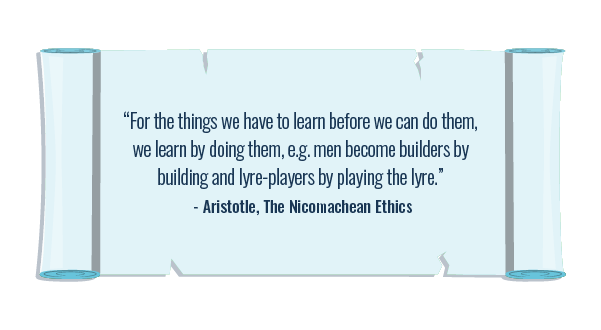
‘For the things we have to learn before we can do them, we learn by doing them, e.g. men become builders by building and lyre-players by playing the lyre.’ — Aristotle, The Nicomachean Ethics
As a result, Aristotle encouraged his students to apply theoretical concepts to practical problems. Doing so helps to develop practical wisdom (‘phronesis’). It also improves students’ critical thinking and problem-solving skills.
5. Multiple Formats
Aristotle enriched his lectures with examples, quotations, references and images. He recognised the power of visual aids in enhancing understanding. Indeed, he once declared, ‘the soul never thinks without an image’.
If he were alive today, it is likely that his approach would have evolved further. It’s easy to imagine him deploying high-impact video and eLearning units to inspire and engage his audience.
6. Cultivation of Virtue
Aristotle’s holistic approach to learning also extends to the cultivation of virtue and moral character in students. Teaching requires more than imparting knowledge. You should also seek to nurture virtues such as courage, temperance and justice.
Whilst intellectual competence has value, it’s not enough to live a fulfilled life. You must also be morally upright and virtuous. And to achieve this, we must put these virtues into practice in a real-world context.
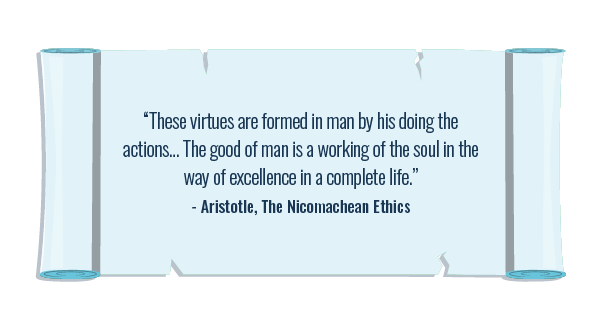
‘These virtues are formed in man by his doing the actions… The good of man is a working of the soul in the way of excellence in a complete life.’ — Aristotle, The Nicomachean Ethics
7. Find the Mean
Throughout his work, Aristotle remains faithful to his principle of the mean. Consequently, he would not endorse overly strenuous or excessive training regimes. Likewise, he would caution against overly simplistic or superficial interventions.
The answer, of course, lies in striking a harmonious balance. This requires tailoring your training interventions to align with your learners’ availability, schedules, preferences and needs.
The Role of the Teacher
For Aristotle, teachers (or ‘didaskalos’) aren’t there to simply transfer their knowledge. They have far greater duty than this. They facilitate, guide and shape their student’s intellectual and moral development. No pressure, right?
As such, teachers should focus on the following responsibilities:
- Facilitating: The primary focus of a teacher or a learning professional should be to create a supportive and nurturing learning environment. This environment should empower learners to take ownership of their education.
- Questioning: Teachers should also be skilled proponents of the Socratic Method. This requires challenging assumptions, encouraging debate and fostering a healthy spirit of scepticism. This helps students to improve their critical thinking skills.
- Mentoring: Teachers serve not only as instructors but also as mentors, offering holistic and personalised guidance to their students. This involves getting to know their learners, so instruction can be tailored to their needs, talents and preferences.
- Being a Role Model: Aristotle also believed that teachers should serve as role models for moral character. They should embody the values they seek to cultivate in their students. Think less Cameron Diaz in Bad Teacher and more Robin Williams in Dead Poets Society.
In essence, teachers assume numerous roles and carry significant responsibilities. Knowledge transfer is really just the start. After all, teachers are entrusted with nurturing student’s intellectual, moral and personal development.
The Key Takeaways for Learning Professionals
Aristotle’s timeless insights into the nature of learning and development continue to inform and inspire learning professionals to this day. That’s despite these views being 23 centuries old.
Integrating the right elements of Aristotle’s teaching philosophy into your organisational learning strategy could help to improve your impact. We recommend incorporating the following key principles within your approach:
- Holistic Goals: Your learning objectives should extend beyond mere knowledge and skill acquisition. You should also seek to foster a culture of holistic development by encouraging learners to set goals for their personal growth, mental well-being and overall fulfilment.
- Personalised Paths: As Aristotle acknowledged, every learner is different. We are all on our own journey. As such, you should tailor your learning experiences to meet the individual needs and preferences of your audience. Using ‘levels’ helps to support these unique development pathways.
- Engagement Strategies: Learning cannot happen without an active and engaged audience. As such, you should design learning experiences that promote participation, such as group discussions and scenario-based learning. Incorporating game mechanics can further enhance engagement.
- Critical Thinking Skills: Develop a learning curriculum that fosters critical thinking skills. Encourage your learners to challenge assumptions and contribute to discussions. Workbook exercises and group activities are particularly effective at promoting these outcomes.
- Practical Application: Aristotle regularly highlights the need to combine theoretical knowledge with hands-on experience. As such, you should seek to provide your learners with opportunities to apply their new-found knowledge and skills in a safe and authentic environment.
- Ethical Leadership: As we’ve seen, Aristotle placed great emphasis on ethical development and moral virtue. This is particularly relevant for the leaders within your organisation. Consider providing training that guides your leaders to act with integrity, compassion and social responsibility.
Final Word
While the full scope of Aristotle’s work may forever remain beyond our grasp, it’s evident that learning occupies a central place in his philosophy. After all, he claims that our happiness and fulfilment relies on it.
Education, Aristotle contends, is not a passive endeavour. It is a dynamic and ongoing pursuit. To achieve this sense of fulfilment, we must actively engage in expanding our theoretical knowledge, applying it in practical contexts and nurturing our moral characters.
For modern instructors, Aristotle’s insights pose significant questions: How can we foster holistic development in our students? How do we ensure active engagement and participation? And how do we inspire learners to transfer knowledge into action?
Addressing these questions holds the potential to unlock eudaimonia — the highest state of human flourishing — for both learners and educators alike.
Thank you for reading. If you’ve enjoyed Aristotle’s views on learning then you may be interested in hearing what other theorists have had to say. Download ‘Using Learning Theories and Models to Improve Your Training Strategy’ now!

